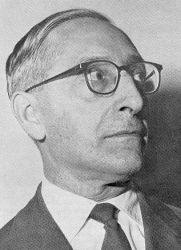Giuseppe Brotzu

Giuseppe Brotzu (Cagliari, 24 January 1895 – Cagliari, 8 April 1976) [1] was an Italian pharmacologist and politician.
Biography
Giuseppe Brotzu was born in Ghilarza, a town of the Province of Oristano, Sardinia. He graduated from the University of Cagliari, Sardinia in (1919) and later completed the specialization in Hygiene at University of Siena in 1922. He graduated in Medicine and Surgery at the University of Bologna in 1925.
He became a professor at the University of Modena and Reggio Emilia in 1932, and between 1939 and 1943 he was the director of University of Cagliari.
Scientific research
Brotzu is recognized as the discoverer of the Cephalosporin based antibiotics, that were first isolated from cultures of Cephalosporium (now known as acremonium) in 1948. He noticed that these cultures produced substances that were effective against Salmonella typhi, the cause of typhoid fever, which had beta-lactamase. He gained the Laurea ad Honorem at University of Oxford in 1971, and was candidated also for the Nobel Prize.
Political career
Giuseppe Brotzu was elected President of Sardinia in 1955, and Mayor of Cagliari in 1960.
Bibliography
- G. Bo, «BROTZU, Giuseppe». In: Dizionario Biografico degli Italiani, Vol. XXXIV, Roma: Istituto della Enciclopedia Italiana, 1987 (on-line)
- Roberto Paracchini (2002). Il signore delle Cefalosporine (Demos). ISBN 88-8467-082-9.
- Bo G (2000). Giuseppe Brotzu and the discovery of cephalosporins. Clin Microbiol Infect 6 (Suppl 3): 6-9. PMID 11449655.
- Bo G (Jan-Feb 1999). Un ricordo del prof. Giuseppe Brotzu. Ann Ig 11 (1): 3-9. PMID 10208039.
See also
